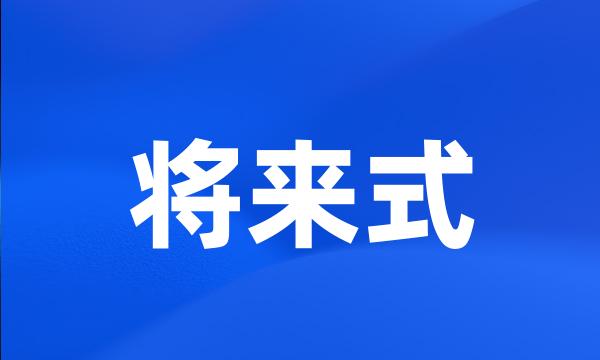将来式
- 网络Future tense;future;be going to
 将来式
将来式-
[future tense] 一种动词时态,在英语中,传统地用 will 和 shall 形成表示将来式
-
改句老师:请把我的哥哥去学校这句话改写成将来式。学生:我哥哥的儿子去学校。
Change a sentence Teacher : please rewrite this sentence in the future tense " my brother sends himself to school " . Pupil : my brother sends his son to school .
-
昨天是过去式,今天是现在式,明天是将来式!
Yesterday is past , today is present , and tomorrow is future .
-
将来式用于表示将来动作或状态的动词形式宜春话有一个将来时态助词格。
The form of a verb used in speaking of action that has not yet occurred or of states not yet in existence . There is a very special future tense auxiliary ge in Yichun dialect .
-
这一部分重在升华,提出理想的审美空间,是将来式、是开放式,也是一种希望,永远作为我们改变生存空间的动力。
The emphasis in this part lies in the sublimation bringing forward the ideal aesthetic space with an open attitude toward the future . This ideal space is also a kind of hope , being always an impulse for changing our living space .
-
该文的工作为将来联合式数字图书馆这一发展方向做出了很好的尝试。
All of the work put forward a good attempt for the direction of future federal digital libraries .
-
第四,在对将来年度税式支出成本的预测上只能尽力而为。
Fourth , the annual cost of tax expenditure in the future is predicted in a possible way .
-
乐观派会认为,美国不可能在不久的将来面临欧洲式的债务危机,但这条缓慢燃烧的导火索本身就是一个问题。
Optimists will point out that America is unlikely to face a European-style debt crisis in the near future , but the slow-burning fuse is itself a problem .
-
对于投资者来讲,封闭式基金的持有人如果继续持有,自动转为将来的开放式基金持有人之后,等于免费认购了新的开放式基金,而没有付出1.5%的认购费用。
It really means a lot if investors continue to hold the share when the closed-end fund changes to open-end fund automatically as investors do not need to pay the1.5 % subscription fee .
-
本文的研究对以硅胶/化钙复合吸附剂-水为工质对的样机设计具有重要的参考价值,对将来固体吸附式制冷技术在实船上的广泛应用具有重要意义。
The research in this paper has an important reference value for the design , of model refrigeration , which takes silica gel-based calcium chloride composite adsorbents-water as working pairs , it is also of great significance for the apply on ship of solid adsorption refrigeration system .
-
要表达你对将来的希望或期待,用现在式(或者用将来式,虽然不是很常见)
To say what you hope about the future , you use the present ( or the future , although it is less common )
